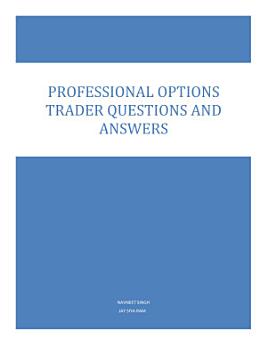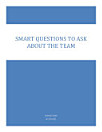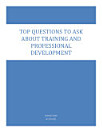Professional Options Trader Questions and Answers - English
About this ebook
1. What does a professional options trader do?
A professional options trader buys and sells options contracts to profit from market movements or manage risk. They analyse market trends, volatility, and underlying assets to develop trading strategies.
2. What is the difference between calls and puts?
Call Option: Gives the holder the right to buy an underlying asset at a specific price before expiration.
Put Option: Gives the holder the right to sell an underlying asset at a specific price before expiration.
3. What skills are essential for becoming an options trader?
Strong analytical and quantitative skills
Knowledge of financial markets and derivatives
Risk management proficiency
Discipline and emotional control under pressure
4. How does implied volatility affect options prices?
Implied volatility represents the market's expectation of future volatility. Higher implied volatility increases option premiums, while lower implied volatility reduces them.
5. What is the Greeks' role in options trading?
The Greeks measure sensitivity to various factors:
Delta: Sensitivity to the underlying asset's price changes.
Gamma: Rate of change of delta with respect to the underlying price.
Theta: Impact of time decay on the option's value.
Vega: Sensitivity to changes in implied volatility.
Rho: Sensitivity to interest rate changes.
6. What is a common options trading strategy?
Covered Call: Selling a call option on an asset you already own to generate income.
Protective Put: Buying a put to hedge against potential downside in an asset you own.
Iron Condor: Selling an out-of-the-money call and put while buying farther out-of-the-money options to limit risk.
7. What are the risks of options trading?
Loss of entire premium paid for options.
Unlimited losses in certain short option positions.
High sensitivity to market volatility.
Complexity of managing multiple positions and factors.
8. How do professional traders manage risk?
Use position sizing to control exposure.
Diversify strategies and underlying assets.
Regularly monitor and adjust positions.
Employ stop-losses and hedging techniques.
9. How much capital is required to trade options professionally?
Capital requirements vary but generally depend on:
Brokerage minimums.
Strategy employed (e.g., spreads require less margin than naked options).
Regulatory requirements for professional accounts.
10. How do traders analyse the market for options trading?
Use technical analysis (charts, indicators).
Study macroeconomic trends and news.
Analyse implied volatility and historical volatility.
Monitor earnings reports and major events.








